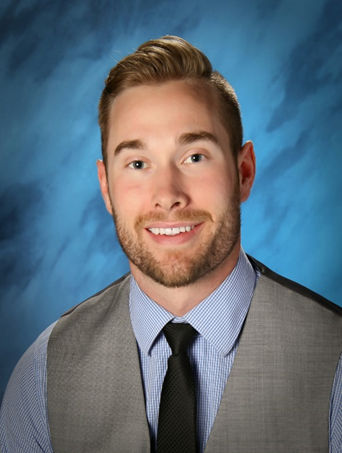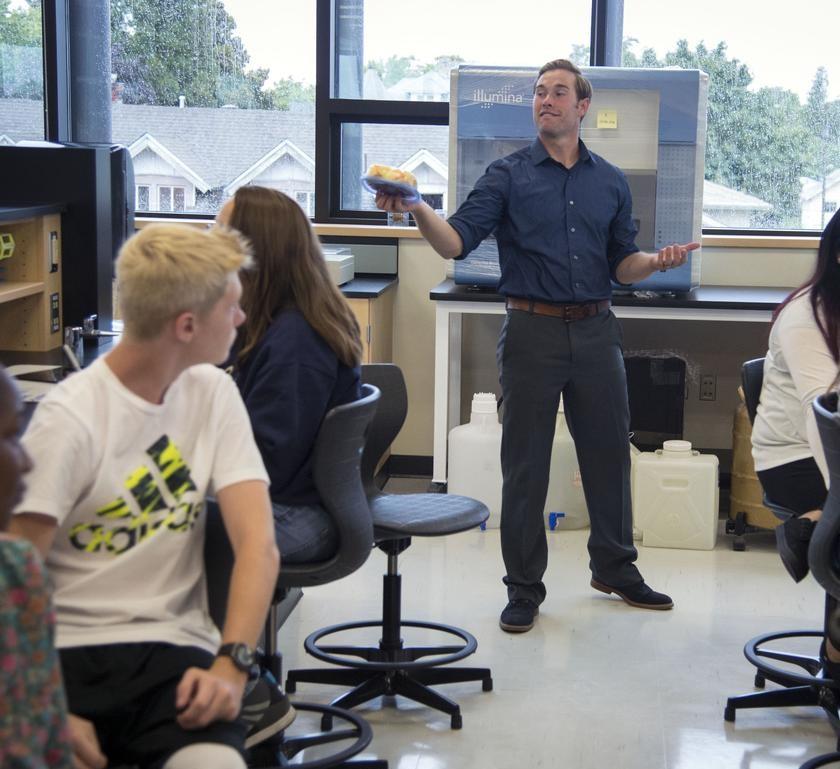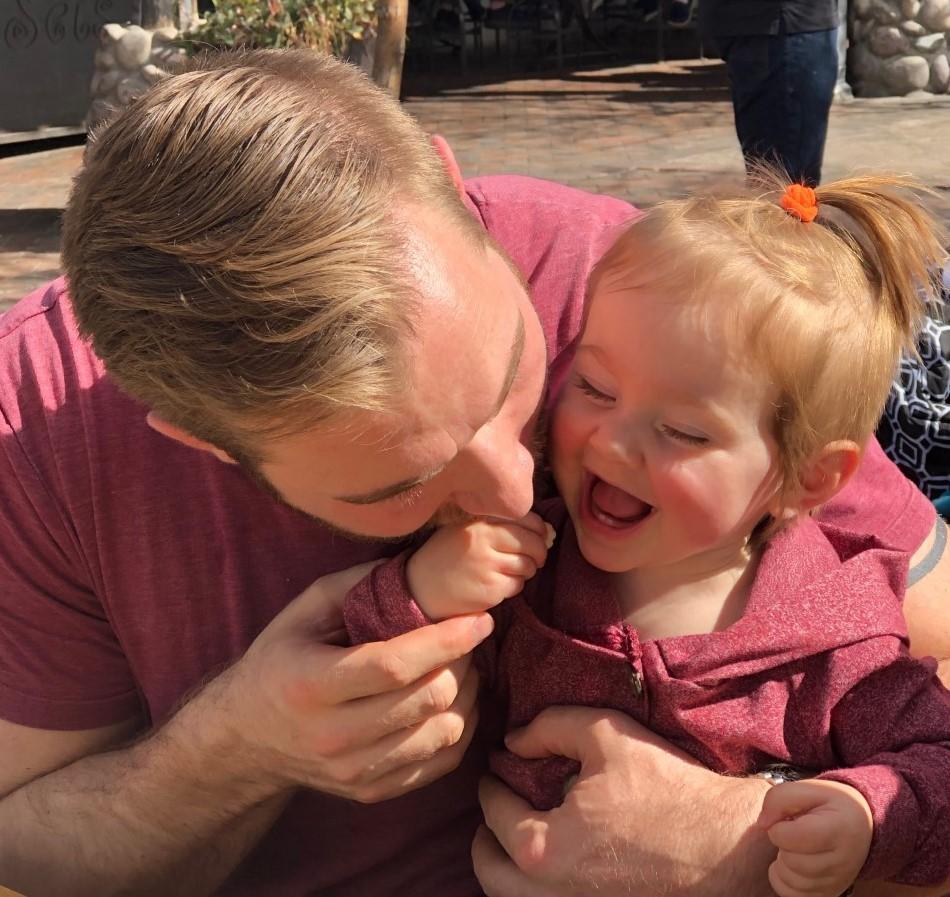Shane Thomas - MCB Outstanding Graduate Student – Teaching
We hear from many of our MCB students that a High School science teacher was the inspiration behind their love of science and desire to pursue a science related career. We can imagine that Shane Thomas, 2nd year MCB PhD student, inspired many students to choose a science major in college during his six years teaching high school. “I would teach for free; I love teaching!” Shane told me when we talked about this award. Each spring, the MCB Department recognizes outstanding graduate students in three categories: Scholarship, Service, and Teaching. The award for Teaching is presented to the graduate student with a commitment to teaching or mentoring that goes above and beyond what is required, positive evaluations or other feedback from students and willingness to help junior graduate students. 
Shane received his B.S. in biology from Washington State University in Pullman Washington. He had a passion for science and was interested in teaching, so he also got his teaching certificate. He taught high school science - AP Biology, Anatomy and Physiology, and a genomics sequencing class. Shane taught in a high school in Spokane with a high percentage of low-income families and was fortunate to have a well-funded science lab (a $16 million lab!) that was open to all schools in the district. Because of the vast array of science equipment available, Shane taught PCR, ELISA’s, Western blots among other biotech techniques and was able to do genetic sequencing on several native populations of animals around Washington while collaborating with Native American tribes and the department of ecology. Even over a zoom meeting, I could see Shane’s face light up when he talked about teaching “I love teaching. It's so fulfilling and so fun. I am grateful I’ve been given a chance to share my insight on science and I find it's so me. I can teach for hours and not know where the time goes. I build relationships with students and when light bulbs are turning on it's very rewarding!”
We talked about the MCB Department award for teaching and I asked what it meant to him to win this award. “I’m very thankful to teach and be in a place where education is important; MCB values it and they have this teaching award. They put their money where their mouth is.”
 Shane didn’t stop teaching when he entered the MCB PhD program at the University of Arizona. He currently teaches the MCB 181L curriculum and MCB Laboratory Preceptor (391a) course. “What I teach is ways of teaching - science meets education. We make sure the students are sound with MCB concepts.” Preceptors for labs are co-educators in the room that help facilitate learning. They are highly motivated undergraduate students who wish to provide instructional support both in and out of the classroom. Undergraduate preceptors work as a team with a graduate or undergraduate teaching assistant and course staff to teach students in Biology 181 labs. It’s a critical role for courses such as MCB 181 lab and undergraduate students enjoy their experience working as preceptors.
Shane didn’t stop teaching when he entered the MCB PhD program at the University of Arizona. He currently teaches the MCB 181L curriculum and MCB Laboratory Preceptor (391a) course. “What I teach is ways of teaching - science meets education. We make sure the students are sound with MCB concepts.” Preceptors for labs are co-educators in the room that help facilitate learning. They are highly motivated undergraduate students who wish to provide instructional support both in and out of the classroom. Undergraduate preceptors work as a team with a graduate or undergraduate teaching assistant and course staff to teach students in Biology 181 labs. It’s a critical role for courses such as MCB 181 lab and undergraduate students enjoy their experience working as preceptors.
I was curious what prompted Shane to decide to pursue his PhD, given that he loved his job teaching high school science. I smiled when his response started with “I met my future wife.” His future wife, now wife, was going to medical school and when she graduated from medical school, she was looking for residency programs. Shane thought this was a good time for him to step back and evaluate what he wanted to do next. “I knew science education would continue to be in my future plans, as I love teaching, so I decided to look into going back to school for my PhD. We looked across the country and our first choice was Tucson. My wife got matched to Banner in their pediatric emergency medicine program. I had been looking at the University of Arizona PhD program even before my wife got her match.”
Shane’s wife, Riley, got her residency match in March 2017 which was past the PhD application deadline so Shane used the time to get to know the university and MCB faculty. “As soon as we knew Tucson, I got in touch with Molly; I already knew I wanted to be in Molly's lab. My passion and niche is to help people learn and understand how people learn. I love the science. I find myself passionate about helping people learn science.” Shane worked in MCB as instructional specialist - teaching the MCB 181L full time. He helped mentor instructors and ran the preceptor program and taught a little of the intro lab. He volunteered in Dr. Molly Bolger’s https://mcb.arizona.edu/profile/molly-bolger lab and took classes from Dr. Weinert and Dr. Nagy. “I loved going to class and I knew MCB was a good fit. It was a nice trial run being in MCB before starting my PhD program.”
While working in MCB, he applied for UA graduate program and knew by then that he wanted to be in the MCB PhD program. “It's a very inclusive program; they don't just push research - they don't just do science but help people do science! There isn’t a single person who doesn't want to help and mentor and collaborate.” Shane knew he wanted to be in Dr. Molly’s Bolger’s lab, with her as his PI and he has been working in her lab since he began his PhD program.
Shane was well into his research when the COVID-19 pandemic hit and the Bolger lab was shut down. His research was using the MCB 181L intro course; he had two curriculums to try to understand how students learn. “And then COVID-19 happened and the university went to online classes. I can't collect as much data in virtual lab classes as when the students are working in 181L in person. Since they aren't doing work in the same way, our data isn't the same, so it's fully disrupted the data collection aspect of my research.” Since data collection in the in person labs stopped, Shane instead focuses on what he can do; “We can do more data analysis now. The data collection would have ended at the end of this semester, but it ended early. The data collected stopped but we can still do analysis. We can look at whether we need to change the data collection. It's still informative, though it may not lead to a publication because we don't have the full story.”
They have enough data from previous semesters that they are going back to and seeing what is worth looking into. In the past, they hadn’t run two MCB 181L curriculums at once so this semester was unique. They hope to go back to two curriculums in the spring of 2021 and continue gathering data. “When it first happened I was so devastated, then when school closed for rest of school year, I was hoping it never happened, but that's what it is! I'm hoping this doesn't prolong my PhD but it might.”
Like so many students whose schooling has been interrupted, Shane is resilient and focuses on the positive and what he can do and sees silver linings of the situation, including spending more time with his daughter, one-year-old Avery. “I don't have more free time, because I have fewer hours of child care now. I have more time to be a father though and enjoy her and be in the moment with her.” 
We wrapped up some final thoughts about teaching and about where his passion for science came from. “I was born in Billings Montana and played outside a lot. I've always been infatuated with living things! Chemistry and physics didn’t catch my attention as much as a caterpillar munching on a leaf; I just wanted to know more and more. How are cells capable of doing anything? What gives them purpose? It's been an intrinsic part of me. I've had such great educators in my life, which helped me choose to be an educator. I got into science education because of my high school teachers and educators. They were amazing!” Thank you to all the teachers who dedicate their careers to education, and we look forward to you continuing to inspire your students Shane, as you continue your passion as a teacher!

